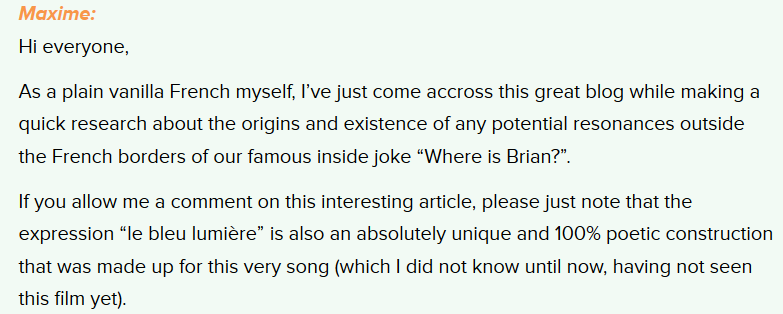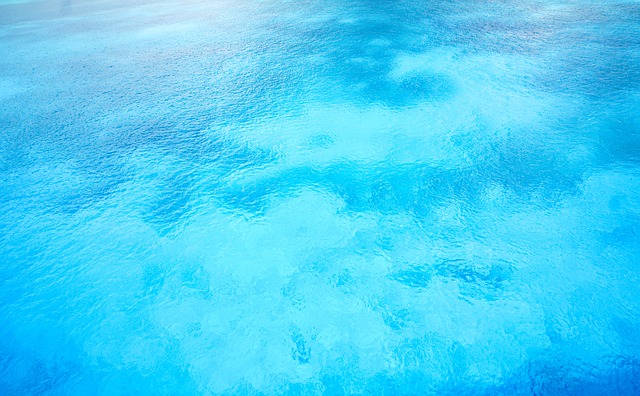Lost In The Deep Blue French – Translating Le Bleu Lumière Posted by John Bauer on Feb 6, 2019 in Culture, Music
After spending the last week singing les paroles (the lyrics) of my favorite song from Vaiana (Moana), I needed to bring it up again. In general, les paroles are often about creatively mixing sounds and words to evoke specific emotions from the audience and that’s no different in the case of How Far I’ll Go. The unique combinations sometimes make use of la licence poétique (the poetic license) and can lead to things that are nearly impossible to translate from one language to another.
Une bête noire (a pet peeve, literally: a black beast) of mine is the often stated idea that there are words that are impossible to translate. In an ironic twist, any time these words are brought up what immediately follows is a translation of the “impossible word” so that everyone can understand what it means.
Cependant (however), in more poetic uses of language where sounds bend and definitions are stretched, it can become rather difficult to translate phrases or odd mixtures of words.
La semaine dernière (last week), I said the name of the famous song from Vaiana, How Far I’ll Go, was Le bleu lumière in French and gave la translation anglaise (the English translation) as The Blue Light. As Maxime, one of our regular readers pointed out, that’s not entirely correct:
 Maxime took the time to further explain why ma traduction (my translation) did not seem right and provided valuable insight into how le titre is seen by les francophones (French speakers).
Maxime took the time to further explain why ma traduction (my translation) did not seem right and provided valuable insight into how le titre is seen by les francophones (French speakers).
Before getting into what la traduction anglaise could be, let’s take a moment to look at how it can’t be The Blue Light.
1) La lumière – The light
La lumière is a feminine word en français and if la chanson (the song) were titled The Blue Light, it would have to start with “la” to indicate the proper genre (gender).
2) Le bleu – The blue
Le bleu as it is in le titre de la chanson (the title of the song) is not an adjective, but instead a noun. Its position in front of lumière and the use of “le“ indicating a masculine noun make it easily felt as un nom (a noun) for les francophones.
3) La lumière bleue – The blue light
La lumière bleue is the correct way to translate the blue light. It follows the correct order with the adjective following the noun and l’adjectif (the adjective) bleue has an “e” to match the feminine word la lumière.
La lumière bleue appears as natural to French speakers as the blue light does to English speakers. On the other hand, le bleu lumière is very odd-looking and stands out to French eyes.
With all that in mind le bleu lumière cannot be the blue light but instead something stranger and more poetic:
Le bleu lumière – The light-blue
For un anglophone (an English speaker) like myself, the light-blue looks like nonsense and it’s hard to see any meaning in it. It’s important to note l’expression (the expression) does also look odd to French speakers. The cultural context of la couleur bleue (the color blue) is however different and because of that it evokes a different emotion for les francophones.
As a reminder, la couleur bleue is not associated with sadness in French culture, but instead brings up more positive feelings of being relaxed and at peace with the world.
Alors comment peut-on traduire le bleu lumière ?
So how can you translate the light-blue?
When I first found une traduction de la chanson, it used the gleam-blue, which definitely keeps the visual strangeness of la version française (the French version), but doesn’t capture the emotions behind it.
In the spirit of trying to capture the cultural ideas behind le bleu français (the French blue) while still having it be somewhat weird to les anglophones, I could think of the following:
The serenity-blue
With all that said, for people learning la langue française (the French language), the most important part of all of this is that you find ways to use the language! Learning all the subtleties of la culture française (French culture) and its poetic wordings takes a lifetime and is a process of first making many mistakes.
While you wait for all the lessons to sink in, take a moment to have fun with le français and sing along to the song, no matter what it’s called!

Build vocabulary, practice pronunciation, and more with Transparent Language Online. Available anytime, anywhere, on any device.





Comments:
Sybille:
Salut! Just another attempt “à tâtons” to translate this elusive phrase: The light-filled blue.
Qu’est-ce que vous en pensez?